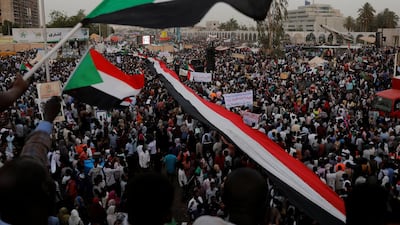As thousands again marched on Sudan’s military headquarters in the capital of Khartoum, the United States joined the call for the military transition council to step aside to make way for a peaceful civilian-led administration.
On April 11, the military removed President Omar Al Bashir after four months of protests against his three-decade rule. While the new head of the army-run transition council has said that they leadership will be limited and it could only be months until they are able to hand over to civilian leadership, protesters are unconvinced.
"The will of the Sudanese people is clear: it is time to move toward a transitional government that is inclusive and respectful of human rights and the rule of law," US State Department spokeswoman Morgan Ortagus said in a statement on Thursday evening.
The remarks appeared to clarify the US position toward the military council's hold on the country, eight days after Mr Al Bashir was removed from office. He is now being held in a central Khartoum prison and two of his brothers have been arrested for corruption as the ruling council cracks down on vestiges of the president’s rule.
A senior State Department official said US Deputy Assistant Secretary Makila James would hold talks in Khartoum over the weekend to assess the situation on the ground.
The official, speaking to reporters on background, described the situation in Sudan as "extremely fluid" and said it was important to avoid a "quagmire of endless deliberations" over who should lead an interim civilian authority.
Demonstrators have said they will not cease until the transitional military council transfers power to civilian-led authorities and elections are held.
Mr Al Bashir faces arrest warrants by the International Criminal Court over accusations of genocide and crimes against humanity in Sudan's Darfur region, but the council has said he won’t be sent to The Hague.
Mr Ortagus said Sudan was still labelled by the US as a state sponsor of terrorism and Washington's policies toward it would be based on "our assessment of events on the ground and the actions of transitional authorities."
But the State Department official said that none of the members of the new military council were under US sanctions.
Sudan was designated a state sponsor of terrorism in 1993 under former President Bill Clinton, cutting it off from financial markets and strangling its economy.
Washington lifted a 20-year trade embargo against Sudan in 2017 and was in the process of discussions on removing it from the sponsor of terrorism list when the military stepped in on April 11 to depose Mr Al Bashir, who ruled Sudan for 30 years.
The Trump administration suspended the next round of the talks, scheduled for the end of April, after the military took control.

